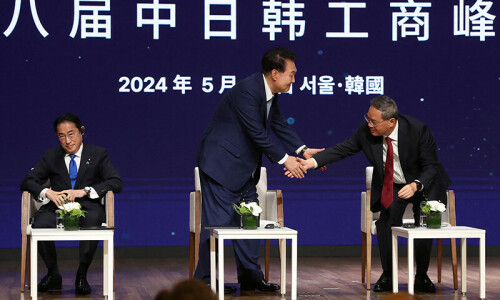KUALA LUMPUR: For the first time in a decade, Malaysia has a feisty and effective opposition — in the form of ex-prime minister Mahathir Mohamad.
Mahathir, disgruntled with government policies since he left office in late 2003, has mounted a withering attack on his hand-chosen successor’s admnistration in the past two months.
At 80 years of age, his stinging criticism of everything from failed state projects to implementation of auto policy has wrought results that opposition parties can only dream of.
After years of mainly turning a deaf ear to the official opposition, the government has suddenly been goaded into action, defending policies and issuing explanations of cabinet decisions.
All because Mahathir feels betrayed and wants answers.
“We welcome any prominent personalities questioning the government,” one opposition leader, Lim Guan Eng, said on Sunday, when asked if the opposition felt it had a new ally in Mahathir.
“If he is genuine ... definitely we would welcome it and even allow him to lead the opposition, but the problem is that he is only focusing on his own interests,” said Lim, secretary-general of the main opposition Democratic Action Party.
Mahathir is no friend of any Malaysian opposition party and says his attacks on his successor, Abdullah Ahmad Badawi, do not mean he has withdrawn support from the ruling coalition.
Mahathir’s criticism focuses on issues close to his heart but not the opposition’s — a planned bridge to Singapore, which was scrapped against his wishes in April, and the recent sale of state-controlled car-maker Proton’s motorcycle unit.
But even people in government circles concede that he has begun to raise doubts in the minds of government supporters.
“We do not want to make use of him or manipulate him, but it’s nothing wrong for Malaysian citizens to share his opinion,” a senior official of Islamist opposition party PAS, Husam Musa, was quoted as saying by Channel NewsAsia on Saturday.
There is no mistaking the air of anticipation his outbursts have caused among opposition politicians like Lim, who was jailed for his political activities during Mahathir’s reign but now sees an opportunity in the fuss his old foe has caused.
“We even expect general elections to be held next year. If the problems with Mahathir persist it will be difficult for Badawi to rule and he will need a fresh mandate,” Lim said by phone from a protest picket in the old port town of Malacca.
Mahathir, whose face launched hundreds of front pages during his 22 years in power, has complained that his criticisms do not get a proper airing now that he is out of office. But he still creates more headlines and headaches than the opposition.
That is because he continues to command grass-roots support within the main ruling party, the United Malays National Organisation (UMNO), which has dominated government since independence in 1957 and can make or break a prime minister.
Mahathir is not the force he once was — his outbursts are proof of his lack of influence over government policy, say Mahathir’s critics — but he knows where the government’s skeletons are buried and age does not seem to have mellowed him.
“Now I don’t know who is in power,” Mahathir told about 500 people on Saturday at a public debate, goading the prime minister to respond directly and questioning his leadership.
For now Abdullah keeps above the fray, using his ministers to rebut Mahathir’s criticisms and to patiently explain cabinet decisions. An aide to Abdullah declined to comment on Mahathir’s latest outburst, and time appears to favour the prime minister.
The next election is not due until 2009, party polls are not due until 2007 and the only real challenger for the leadership, Deputy Prime Minister Najib Razak, has vowed loyalty to Abdullah.
But in reality, say political analysts, the clock is ticking and an early election is likely, if only because another potent opposition force will be unleashed before long: Mahathir’s former deputy, Anwar Ibrahim.
Anwar, who caused a much bigger stir in Malaysian politics before he was jailed in 1999, is free and a ban on him standing for election or party office is due to lapse in April 2008.—Reuters













































Dear visitor, the comments section is undergoing an overhaul and will return soon.